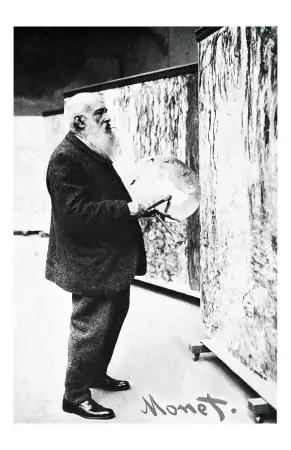Monet Chronology
Date
Event
1840
Claude Monet is born on November 14 in Paris.

Self-Portrait, oil on canvas, 1886
1845
Monet moves with his family to Le Havre.
1857
Monet exhibits some of his caricatures at an artists’ materials shop. Monet's mother, Louise, dies.

The Man in the Small Hat c. 1855-1856 graphite on tan paper (ivory wove card)
1858
Monet meets Eugène Boudin, who introduces him to painting en plein air. Monet exhibits a painting of Rouelles in Le Havre at the Société des Amis des Art.
1859
Monet visits the Paris Salon for the first time and continues landscape painting.
1860
Monet moves to Paris and enrolls at the Académie Suisse. Monet meets influential painter Camille Pissarro.

Flowers, 1860
1861
Monet is drafted to serve in the cavalry regiment of the 1st Chassuers d’Afrique in Algeria. Monet is inspired by the North African light and landscape.
1862
Monet becomes gravely ill and is relieved of military service to recuperate in Le Havre. His Aunt is able to pay for his permanent release form military service, and Monet resumes artistic training in Paris.

Hunting Trophies
1863
Monet starts painting in Chailly near Barbizon. This same year the Salon des Refusés is held at the Palais de l’Industrie.

Walk (Road of the Farm Saint-Siméon), 1864
1865
Monet’s paintings are submitted for the first time to the official Salon. Camille Doncieux, his future wife, and Bazille pose for Le Déjeuner sur l’herbe (the Picnic).
1868
Monet suffers depression due to stress over money and tries to drown himself. Monet recovers and receives a commission from the Gaudibert family of Le Havre.
Monet receives four silver medals for his paintings and moves with his family to étretat, not far from Le Havre.
1869
Monet again runs out of money and moves to Saint-Michel.
1870
Monet marries Camille on June 28. The war begins and Monet leaves many of his paintings with Pissarro, as the Franco-Prussian War was beginning.

Camille Monet on a Garden Bench, 1873
1871
Monet moves to London when the war begins.
Monet meets Durand-Ruel in London with Pissarro and Daubigny.
After the death of his father, Monet visits the Netherlands and then moves to Argenteuil.

The Church at Vétheuil
1872
Monet paints Impression Sunrise / Impression Soleil Levant in the port of Le Havre.

Impression, Sunrise
1873
Monet decides to start an independent society of artists called the “Société anonyme.” He recruits artists: Pissarro, Sisley, Jongkind, Renoir, Cézanne, and Morisot. Only Monet opposes the idea.
1874
Exhibits Impression, Sunrise for the first time. Art Critic Louis Leroy coins the term “Impressionism” after this painting. This is seen as the first Impressionist Exhibition.
1876
Monet holds a second exhibition with the Société anonyme and meets Ernest and Alice Hoschedé while staying at their country home “Chateau Rottembourg”
1878
Birth of Michel Monet.
Monet and his family settle at Vétheuil with the Hoschedé family.
1879
Death of Camille.
1881
The family moves to Poissy.
1883
Monet rents a house at Giverny (where he will live for 43 years)
1887
Monet exhibits in New-York because of Durand-Ruel
1889
Monet exhibits with Rodin.
1890
Monet purchases rented house in Giverny.
1891
Death of Ernest Hoschedé. Monet paints the series of Meules (Haystacks) and of Peupliers (Poplars).

Wheat stacks, Snow Effect, Morning
1892
Monet paints the Rouen Cathedral series.
Marries Alice Hoschedé (now Alice Monet) in July.

1894
Monet is visited in Giverny by Mary Cassatt, Cézanne, Rodin, Clemenceau and Geffroy.
1900
1903 Monet paints several views of the Japanese bridge.
He takes several painting trips to London.
1904
Monet travels to Madrid and admires the paintings of Velasquez.
1907
First problems with his eyesight.
Monet travels to Italy and, discovers his love of Venice
1911
Death of his wife, Alice
Monet travels to Italy and, discovers his love of Venice
1914
Death of Jean, Monet’s eldest son. Blanche moves to live near Claude Monet.
1916
Monet works on twelve large canvases of Water Lilies.
1923
Monet has an operation for a cataract in one eye, which had made him nearly blind. His vision is slightly improved after the operation.
1923
Monet has an operation for a cataract in one eye, which had made him nearly blind. His vision is slightly improved after the operation.

Monet Working on Water Lilies, near end of life
1926
At the start of the year Monet is still painting but suffers from lung cancer. Monet dies on December 5 and is buried at Giverny.